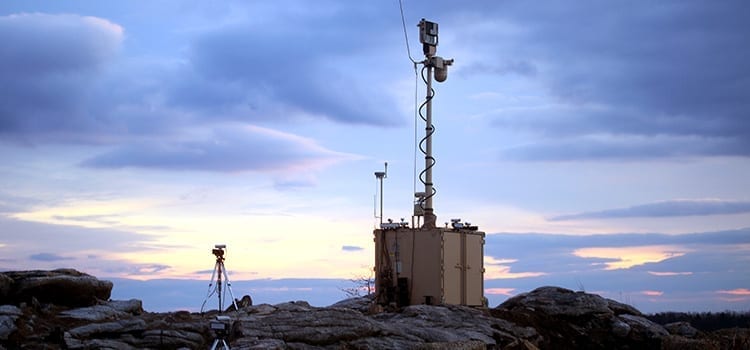The Joint United States Forces Korea (USFK) Portal and Integrated Threat Recognition advanced technology demonstration (JUPITR ATD) – is underway and already making a huge difference to the Korean Peninsula. JUPITR, a program led by the Joint Program Executive Office for Chemical and Biological Defense (JPEO-CBD) and supported by the U.S. Army Edgewood Chemical Biological Center, will provide unique biological detection capabilities that will address the demand for stronger biosurveillance capabilities on the Korean Peninsula.
JUPITR supports the Homeland Security Presidential Directive-21, which is a policy stating that biological threats could take many forms, including naturally occurring disease outbreaks. This policy led to the National Strategy for Countering Biological Threats in 2009 which recognized that an outbreak of disease could impact national security just as much as an overt attack on US forces.
In 2012 the first ever National Strategy for Biosurveillance was established with the goal, “to achieve a well-integrated national biosurveillance enterprise that saves lives by providing essential information for better decision making at all levels.” The JUPITR program introduces new instrumentation that increases speed and ease of biosurveillance equipment for the USFK. The instrumentation also comes at lower cost, less training and burden to the soldier with higher performance results. JUPITR’s presence on the Korean Peninsula aligns with the Joint Force’s strategy to rebalance military efforts toward the Asia-Pacific region.
“Our long standing commitment to the security of South Korea and the DOD’s “Pivot to the Pacific” made the choice of basing the JUPITR ATD within the Republic of Korea a straight forward selection,” said Peter Emanuel, JUPITR ATD Team Lead and ECBC Biosciences Division Chief.
As a part of the program, researchers from ECBC and JPEO-CBD will be traveling to South Korea on short-term rotations. The first rotation started in summer 2013 and will continue for the next two years. In these rotations, the ECBC/JPEO-CBD representatives help the USFK build advanced laboratory capabilities in-house, and personally train and demonstrate the JUPITR instrumentation.
Specifically, the ECBC/JPEO-CBD representatives are helping to certify the 106th Food Safety Laboratory in South Korea with a Biosafety Level 2 (BSL 2) laboratory standard in Youngsan AG. This certification will allow this lab to safely receive and analyze real-world contaminated samples. The traveling group started their work by demonstrating the power of the BioFire Film Array, the IQUUM Liat and the 3M Focus, all of which are new biosurveillance analysis instruments.
This level of interaction with the end-users in South Korea ensures that ECBC and JPEO can gain rapid feedback, make quick adjustments and ensure that the biosurveillance equipment functions properly in the South Korean environment. ECBC/JPEO-CBD representatives are also able to train one-on-one and build important relationships with the USFK.
“This in-person JUPITR method is innovative,” said James Wright, a biologist in ECBC’s BioScience’s Division and among one of the first researchers to travel to South Korea. “It allows us to acquire the results quickly, get direct feedback from the soldiers and efficiently see our results first hand. It’s very exciting and a great developmental assignment for us to participate in as laboratory scientists.”
So far, the groups have worked directly with the 121st Medical Group, the 106th Veterinary Support and the 51st Air Force Medical Group in South Korea. ECBC/JPEO representatives were able to provide USFK with new capabilities that enhance the efficiency and functionality of their labs. For example, new equipment such as the BioFire Film Array, can run Dry Filter Unit (DFU) samples in five to six hours compared to the current system which would run samples in a couple days.
Julie Renner, a toxicologist from ECBC has already completed two rotations in South Korea. When Renner saw how JUPITR’s instruments could obtain results faster than it took USFK to prepare a sample for the current equipment, she realized the true impact of JUPITR. “The imminent need for these new instruments and capabilities they offer became apparent,” Renner said. “Also, in meeting with and creating a relationship between the 106th and the 501st CBRNE (chemical, biological, radiological, nuclear and explosives) Tech Escort, we were able to bridge a huge and long-overdue gap that is necessary for future exercises across the peninsula and for real-world bio-threat readiness.”
The projects that ECBC/JPEO representatives led while in South Korea, range across many disciplines from instrumentation training to classroom training. Marcus Thermos, a member of the ECBC training team was able to teach a course about basic Chemical and Biological defense to USFK personnel during his time in South Korea.
“I taught a course for 18 soldiers. While they were familiar with the Army, they didn’t know too much about the chemical and biological defense program and the work we were doing, so I had the opportunity to give them a crash course that they found very rewarding,” Thermos said.
JUPITR combines advanced communications with cutting-edge detection capabilities to design a program that will bring rapid and efficient biosurveillance. The program is comprised of four “legs” that work simultaneously to achieve JUPITR’s goal. The first leg is an information portal that is similar to a health surveillance web management tool. This portal will house a library of identified biological substances in a cloud library that authorized personnel can access.
The second leg sends ECBC researchers to South Korea to work alongside USFK representatives to improve their laboratory capabilities. This allows the USFK to conduct analysis at their own facilities rather than shipping samples back to the U.S. The third leg, called the “Shoot-Off” tests a number of biological detectors, and sends the best one to South Korea.
The last leg, called Integrated Base Defense is a large multi-functional, all seeing sensor that can rapidly design a defensive perimeter. Together, these legs form a dynamic, multifaceted program that will advance the biological detection capabilities of the Korean Peninsula.
Supporting organizations for JUPITR include the Department of Homeland Security, Office of the Assistant Secretary of Defense for Health Affairs, Health Affairs and Defense Threat Reduction Agency.



